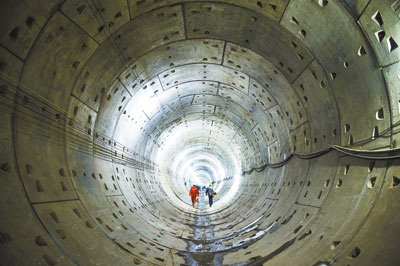
PRIVATE Chinese companies taking part in a scheme to reduce the State’s dominance in building infrastructure are finding competition is coming from an unusual place — the government peers they are supposed to replace.
Private-sector businessmen say they are losing out in most projects to State firms, which are favored by local authorities because they are seen as financially stronger and better able to raise capital. State companies are also more likely to bid for projects that private firms consider financially unfeasible.
Finance ministry data show that 600 public-private partnerships (PPP) have so far found partners, and analysts say that about three-quarters of the investment has come from State-owned firms.
“The government is willing to work with government firms, but cooperation with private companies is a shambles,” said Yan Jiehe, chairman of China Pacific Construction Group, which grew to become China’s largest private builder by revenue over the last 20 years by building roads and bridges for local governments.
Yan has no plans to invest in any of the advertised PPP projects, which range from municipal works to highway schemes.
“None of the projects make financial sense,” he said.
The Central Government is investigating why the private sector is winning so few projects. The Central Government has promised to reduce the oversized role of State enterprises in the economy, so any failure of the PPP scheme would raise doubts about that goal.
Government officials are already worried about signs of a rapid slowdown in the private sector. Investment growth slowed to a record low 3.9 percent in January-May from the year-earlier period, which compares with a double-digit pace last year.
Private firms provide the lion’s share of overall investment in China and create 90 percent of new urban jobs.
Shut out
Problems with the PPP scheme may be more fundamental. Local authorities have advertised close to 9,000 PPP projects — worth an estimated 9.8 trillion yuan (US$1.47 trillion) — so most have yet to find a partner at all.
While Britain’s PPP scheme limits partnerships to a state authority and the private sector, China does not differentiate between government and private firms. At best, government firms are not allowed to bid on projects in their home province but are free to do so elsewhere.
Still, infrastructure projects would not get done without the participation of government firms because the State is so dominant in the economy, said Wang Shouqing, a Tsinghua University professor who advises local authorities across China on the financing of PPP projects.
“It was unrealistic to stop State and government firms from participating,” Wang said. “But placing no restrictions on them has resulted in this, because they run on a different playing field.”
In 2014, China pledged to give PPP funding more policy support and began offering rewards of up to 8 million yuan to all participating firms.
That prompted local governments across the country to advertise projects as PPP, hoping China’s policy focus would lead to faster approvals. State media has reported that the government is seeking views on a draft PPP law.
Unsuitable
Water treatment PPP projects have been the most popular among private investors because many have operating agreements that allow firms to collect fees from end-users, unlike other “build-and-transfer” schemes, like roads, that rely on the local authority for payment, analysts said. Agreements with local authorities leave the firms at risk of sudden changes in policy or budget priorities.
Government firms, however, have tended to heavily undercut private companies on bids, said He Yuanping, chief financial officer of water treatment firm Beijing Originwater Technology. The company is involved in close to 80 PPPs and has mostly won projects on the back of its technology, he said.
Other executives said project terms are not always viable. Some offer lengthy repayment periods of up to 30 years, or uncompetitive returns as low as 1-2 percent, they said.(SD-Agencies)
|

